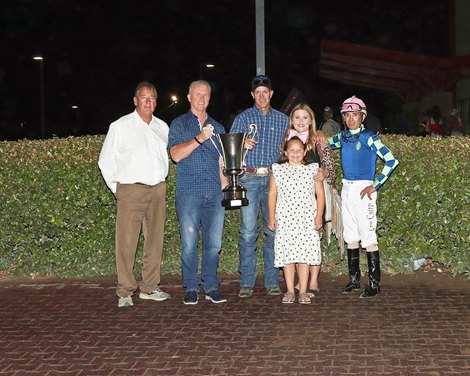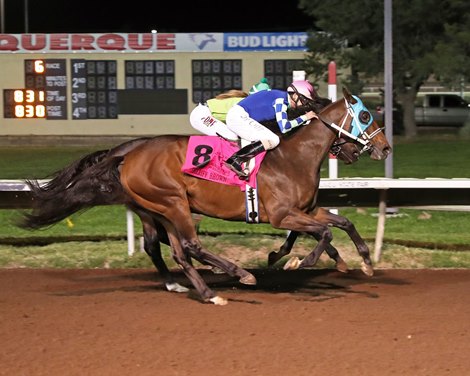On Sept. 11, the Federal Trade Commission overturned the first appeal of a Horseracing Integrity and Safety Authority to come under its purview.
But while that decision might give hope to horsemen skeptical of HISA and/or the appeals process, there is also reason for concern. The costs associated with taking an appeal beyond HISA and to the FTC could be prohibitive to many in the industry.
Despite coming out victorious, pending a potential appeal for which HISA has 45 days to do, owner and breeder Joey Peacock was blunt in his assessment of the proceedings.
“We were very, very disappointed in the appeal process through the HISA panel. I mean, it was honestly the HISA panel appeal was a joke,” Peacock said.
An email to HISA was not returned.
Sign up for BloodHorse Daily
The ruling by the FTC involves jockey Oscar Ceballos, who rode the Peacock Family Holdings homebred Sheriff Brown in the Downs at Albuquerque Handicap at Albuquerque Sept. 24, 2022. In that race, which the son of Curlin won, HISA determined that Ceballos struck the gelding 11 times with his riding crop—five more than allowed.
Ceballos was fined $2,160, suspended three racing days, and received five HISA points.
But the argument made by Peacock is that the rules allowed for the jockey to use the crop to ensure safety. Because Sherrif Brown is prone to lugging, or leaning toward one side, Ceballos used the crop in a manner to keep other horses and jockeys safe. HISA’s rules apply toward strikes to the hindquarters but claimed other strikes apply as well.
Chief administrative law judge D. Michael Chappell, who ruled on the appeal at the FTC level, agreed with Peacock’s assessment that HISA inappropriately considered strikes with the crop on the neck and shoulder and or flagging on the left neck and shoulder that were done to prevent the horse from lugging in and causing an accident as inappropriate.
What Peacock appreciated about Chappell is that he was a “disinterested party” so he asked sharp questions. A concern Peacock had about the initial process is that the track stewards relied on one of their own, Larry Fontenot, who has no riding experience and couldn’t comprehend the situation from Ceballos’ perspective. This was a factor on which Chappell sided with Peacock.
Peacock said HISA also heard the opinion of someone with riding experience from an outside jurisdiction but the governing body “disregarded” that input.

Sheriff Brown’s connections celebrate the Downs at Albuquerque Handicap victory
Another area of concern for Peacock is that, in his opinion, HISA used poor-quality video from a head-on perspective to make its case. In the video, poor lighting made it uncertain how many times Ceballos used the crop. He also believes that the wording of the rules was done in such a fashion to make the appeals process as difficult as possible.
“The clever lawyers that drafted those rules and regulations for HISA made any appeal process so much to HISA’s advantage that it just really didn’t give us an opportunity to have the entire argument really analyzed or evaluated or even considered,” he said.
Peacock added, “The bottom line is, hey, if you’ve got a poorly written rule, fix it.”
Combating a penalty that you believe is unfair is also not cheap.
For winning the race, Sheriff Brown earned $108,000. Peacock had to hire an attorney for the HISA appeal and then a constitutional attorney for the FTC appeal. Peacock said that when it is all said and done, the legal fees will likely make this a break-even proposition. That’s not the type of cost many in the industry can afford to take on even if they were to be vindicated.
“The disappointing thing is, if anybody wants to take an appeal as far as we did, because they feel like they’re right, which we 100% felt like we were in the right, it’s going to cost a significant amount of money to do that,” Peacock said. “And I think that lets a lot of people at the racetrack off. I mean, obviously, the bigger stables and the bigger owners, they can write the check and not worry about it. But there’s a whole lot of people that can’t.
“When you start looking at the smaller venues, most of the people that are racing those venues, can’t afford to go fight HISA and then the Federal Trade Commission.”
Peacock’s advice to anyone looking to challenge a HISA penalty is to first read the rules and make sure you understand them. Then assess if it’s worth fighting.
He said, “If you’re going to go fight something, you better believe you’re 100% in the right or you’re just wasting your time.”
Peacock said that had he lost his FTC appeal it would have set a bad precedent, that jockeys risking their lives would be penalized for trying to preserve safety.
There is plenty of criticism thrown HISA’s direction. Peacock hopes that this episode can help build a better way forward with disputes.
“For the record, I want everybody to know I’m not anti-HISA; I support the concept of a national racing authority. I think it’s going to be very, very good for the sport in general. But in anything, you’re going to have disputes that arise,” he said. “And I don’t care if you’re talking about horse racing or business or whatever. But, when you have disputes that arise, the people that settled those disputes should have some knowledge of the subject matter and that was not at all what we had in HISA. … They need to really try to endeavor to put together some experts to hear the appeals that have some experience in the subject of the appeal.”










Leave feedback about this